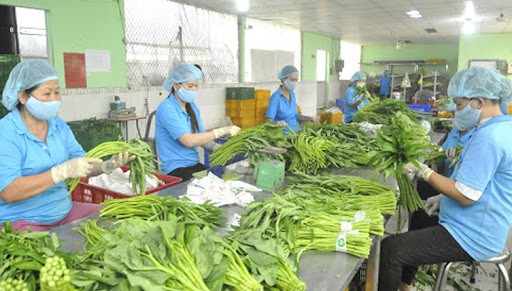
Vietnam GDP Picture: Ministry of Industry and Trade Exceeds Expectations
19:05 | 23/03/2025 12:08 | 09/01/2026Finance-Banking
 |
| Fruit and vegetable exporting enterprises need to flexibly adapt to the market to minimize risks (Photo: agritrade.com.vn) |
Recent data by the Ministry of Agriculture and Environment of Vietnam has shown positive signs across the agricultural, forestry, and fishery sectors. In particular, total agricultural exports in the first quarter of 2025 reached $15.72 billion, reflecting a 13.1% year-on-year increase.
However, fruit and vegetable exports in March 2025 were estimated at $450 million, bringing the total Q1 value to $1.14 billion, an 11.3% decline from the same period in 2024. This downturn is a stark contrast to last year when fruit and vegetable exports saw continuous growth from the beginning of 2024, culminating in a record $7.1 billion in annual revenue.
Against this backdrop, U.S. President Donald Trump’s newly imposed global reciprocal tariffs, including a 46% tariff on Vietnamese products (one of the highest globally) is expected to exert significant pressure on Vietnam’s fruit and vegetable exports.
Dang Phuc Nguyen, Secretary-General of the Vietnam Fruit and Vegetable Association (Vinafruit), has recently shared insights on this issue.
There’s no need for panic
Regarding U.S. tariff policies, Nguyen advised businesses not to overreact. The 46% tariff will not be applied to all Vietnamese exports; instead, Nguyen believes it will target products with large trade surpluses or those suspected of containing third-country materials. The final list of affected goods is expected to be officially announced by the U.S. on April 9.
In agriculture, the new U.S. tariffs are expected to impact wood and seafood exports the most, as these categories have high export values to the U.S. Fruit and vegetable exports to the U.S. account for only about 5% of Vietnam’s total fruit and vegetable export turnover, meaning the risk of tariff imposition remains low.
However, Nguyen emphasized the importance of closely monitoring U.S. policy developments and proactively adjusting business strategies. Companies should reassess production processes to cut costs, enhance competitiveness, and ensure product quality meets market standards.
Nguyen also noted that the U.S. tariff policy poses minimal risk to the fruit and vegetable sector. The trade balance is currently in favor of the U.S., reducing the likelihood of broad tariff application. In 2024, Vietnam exported $360 million worth of fruits and vegetables to the U.S. while importing $540 million from the U.S.
Lessons from the past and future strategies
Nguyen also reminded businesses that this is not the first time President Trump has introduced such tariff measures. During his first term, similar trade policies were implemented, putting pressure on Vietnam’s market. However, through resilience, diplomatic flexibility, and enterprise adaptability, Vietnam successfully navigated those challenges.
The Secretary General of Vinafruit believes that the same approach will be effective this time. The key for businesses, particularly in the agriculture, forestry, and fisheries sectors, is to remain calm, stay informed, and prepare documentation to clearly verify the origin of their products.
Additionally, Nguyen advises businesses to pay close attention to the increasingly stringent requirements of import markets. For instance, the European Union continuously updates its quality and food safety standards, with some regulations having been amended more than 100 times.
On the other hand, Vietnamese authorities must strive to protect sectors where Vietnam has strong domestic production capabilities when negotiating with the U.S., particularly in agriculture, to safeguard livelihoods for businesses.
In these uncertain times, businesses must remain agile and swiftly adapt management and operational strategies to mitigate export disruptions. Specifically, companies should optimize every stage of production—from sourcing raw materials to processing, logistics, and cost control—to maintain competitiveness against countries facing lower tariff rates.
Moreover, Nguyen advises businesses to focus on product diversification, quality enhancement, and proactive market adaptation. Vietnamese industries and enterprises must also intensify trade promotion efforts, expand markets, and reduce reliance on a few major buyers.
“Vietnam has already signed 17 free trade agreements, presenting significant opportunities for businesses to tap into markets where Vietnamese goods enjoy preferential tariffs. By leveraging these trade deals, businesses can expand their reach and secure a more stable export future”, said Nguyen.

19:05 | 23/03/2025 12:08 | 09/01/2026Finance-Banking

19:05 | 23/03/2025 11:55 | 09/01/2026Trade

19:05 | 23/03/2025 11:50 | 09/01/2026Economy

19:05 | 23/03/2025 11:05 | 09/01/2026Science - Technology

19:05 | 23/03/2025 14:11 | 08/01/2026Industry